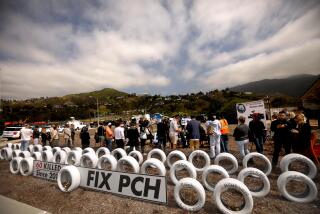Organizations Hit the Road--Then Clean It Up
- Share via
OKLAHOMA CITY — Blue-and-white signs posted beside Oklahoma’s highways inform motorists that a stretch of asphalt has been adopted by a fraternity, a humane society, a motorcycle club.
The signs are part of an effort to involve everyday people in the unending task of keeping the roadsides from looking like garbage dumps, and officials say that, aside from some concern about safety, the adopt-a-highway idea is booming.
Community Competitions
“It’s going into beautification and really a pride of communities. . . . Not only that, but competition between communities, which adds even more emphasis,” said Wayne Muri, chief engineer for the Missouri Highway and Transportation Department.
Nine hundred groups are participating in Missouri, and they have not only picked up trash, they have planted millions of daffodil bulbs.
In Oklahoma, which began the program in 1987, Gov. Henry Bellmon joined 20,000 volunteers April 8 in the state’s first highway Trash-Off. In all, 1,000 groups have adopted a couple of miles of highway apiece and have their names on the signs.
Idea Started in Texas
The birthplace of the notion was Texas, which had a problem that was, well, Texas-sized. The problem gave rise to a “Don’t mess with Texas” celebrity ad campaign and the adopt-a-highway program, which now involves more than 3,250 groups.
Subsequently, more than 20 states have started adopt-a-highway programs.
Texas highway officials, concerned about the state’s liability for injuries to people picking up trash along the highways, decided on a one-year pilot program just around Tyler, but demand for the program mushroomed.
“We bit the bullet and went with it,” said Billy Black, a public affairs officer for the Texas Highway Department who was a co-developer of the program. “We’re getting sued for something every day, anyway.”
Some states, such as South Dakota, are still drawing up safety rules.
“We’ve been very fortunate,” Muri said in Missouri. “The folks out there have been very safety conscious.”
Videotape Stresses Safety
In Oklahoma, Joanne Orr, beautification director for the Department of Transportation, said the state has developed a videotape of instructions: wear gloves, clean one side of the road at a time and avoid picking up syringes or guns.
The signs cost the highway departments about $35. Groups must pick up litter four times a year or their signs come down. Other expenses include trash bags and personnel to pick up the bagged litter.
Officials say the expense is well worth it. “Oklahoma has 116,000 acres of roadside. That, in effect, is our front yard,” Orr said.
More to Read
Sign up for Essential California
The most important California stories and recommendations in your inbox every morning.
You may occasionally receive promotional content from the Los Angeles Times.













